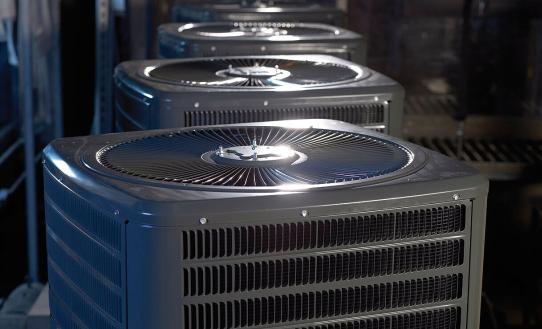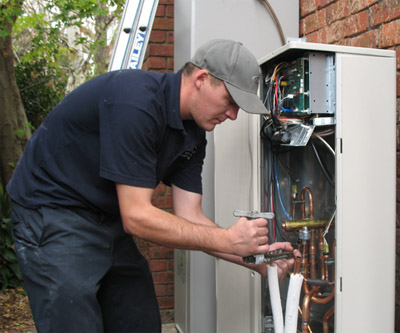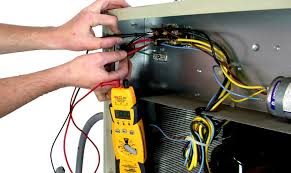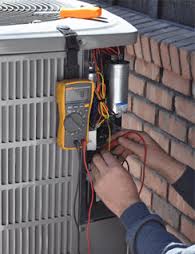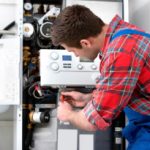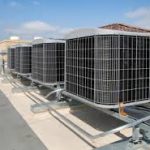King George, Va – If your heating and cooling system has broken down and you’ve noticed it’s not quite as spry as it once was, you may be contemplating your repair vs. replacement needs. Is it too soon for replacement? Is repair your best choice in the long run, or would a newer, more efficient system offer you the function and dependability you’ve been looking for? When determining repair vs. replacement, there are many considerations.
Benefits to Replacement
Substantial Cost Savings
If your heating, ventilation and air conditioning system (HVAC) is more than 10 years old and repair costs are approaching 50 percent of the value of the system, a great deal of energy can be saved by upgrading to a newer, more efficient system. Depending on the Seasonal Energy Efficiency Ratio (SEER), upgrading could save you 20-40 percent on heating and cooling costs.
Use a furnace? Answering the repair vs. replacement question is easy. According to Annual Fuel Utilization Efficiency (AFUE) ratings, which measure furnace efficiency, systems from the 1970’s offer AFUE ratings of about 65 percent, while today’s models offer near total efficiency – 97 percent. That adds up to a lot of energy dollars.
Tax Incentives
In addition to energy savings that add up over the lifetime of your new system, available tax credits and incentives could save you up to 30 percent of the cost of newer, high efficiency systems. Look for the ENERGY STAR label for your best options when considering repair vs. replacement.
Warranty
Newer units come with a warranty, which help you save on repair costs should any issues arise.
Green Benefits
The U.S. Government and the Environmental Protection Agency (EPA) have mandated the phase-out of R-22 refrigerant by 2020 in an effort to protect the ozone. Upgrading to a R-410A system not only helps the environment, it helps you avoid the high costs of repairing an older system as supplies of R-22 are further cut each year due to the phase-out.
Comfort and Air Quality
Newer systems do a better job of controlling temperature and humidity, which reduces mold and mildew growth, improving both comfort and air quality in your home.
Convenience
No more waiting around in an uncomfortable home for repair services or hard-to-find parts for your old system.
Does repair make more sense for my system?
Newer Systems
For new or relatively new systems, it is likely that repairs make the most financial sense.
The 50 Percent Rule
If the cost for repair vs. replacement of your system is less than half of its value and you haven’t been suffering the need for monthly service calls to keep your system up and running, repair may be easier on your checkbook.
Moving
If you are planning on moving out of your current home in the immediate future and your system is still working, talk to your local real estate agent to determine whether either repair or. replacement would be in your best interest.
Maintenance
If your system is sitting on the fence – neither old nor new — some simple maintenance techniques may help prolong its lifespan and make immediate replacement unnecessary. Ask your technician if this is in your best interest, and if so, what you can do to get a few more miles out of your existing system.
Recognizing the Time for Repair vs. Replacement
Age
When it comes to repair vs. replacement, the EPA and Department of Energy’s joint ENERGY STAR program recommend HVAC (heating, ventilation and air conditioning) systems older than 10 years old and furnaces or boilers older than 15 years old be replaced. Though these systems may last a few years longer, they will increasingly lose energy efficiency over time, costing you energy dollars.
Frequent Breakdowns During Peak Use
If your system can’t handle the demands on its performance during the hottest and coldest times of the year, or has broken down multiple times over the past several years, repairs may not be in your best interest. In some cases they can add up substantially over time, costing you more than investing in a new system.
Uneven Temperatures
Uneven temperatures are an indicator of a possible need for a heating and cooling upgrade.
Noise
If your system has to overexert itself to keep up with the heating and cooling demands of your home, it can become excessively noisy or turn off randomly. Establish and maintain a regular maintenance schedule to preserve the function of your system, including annual professional maintenance to prevent problems before they occur.
If you’re having difficulty determining whether either repair or. replacement is in your best interest, contact CMR Heating and Air. Our professional technicians treat your home like it is our own, and can help you determine whether repairing or replacing your existing system offers you the best solution to fit your needs.

